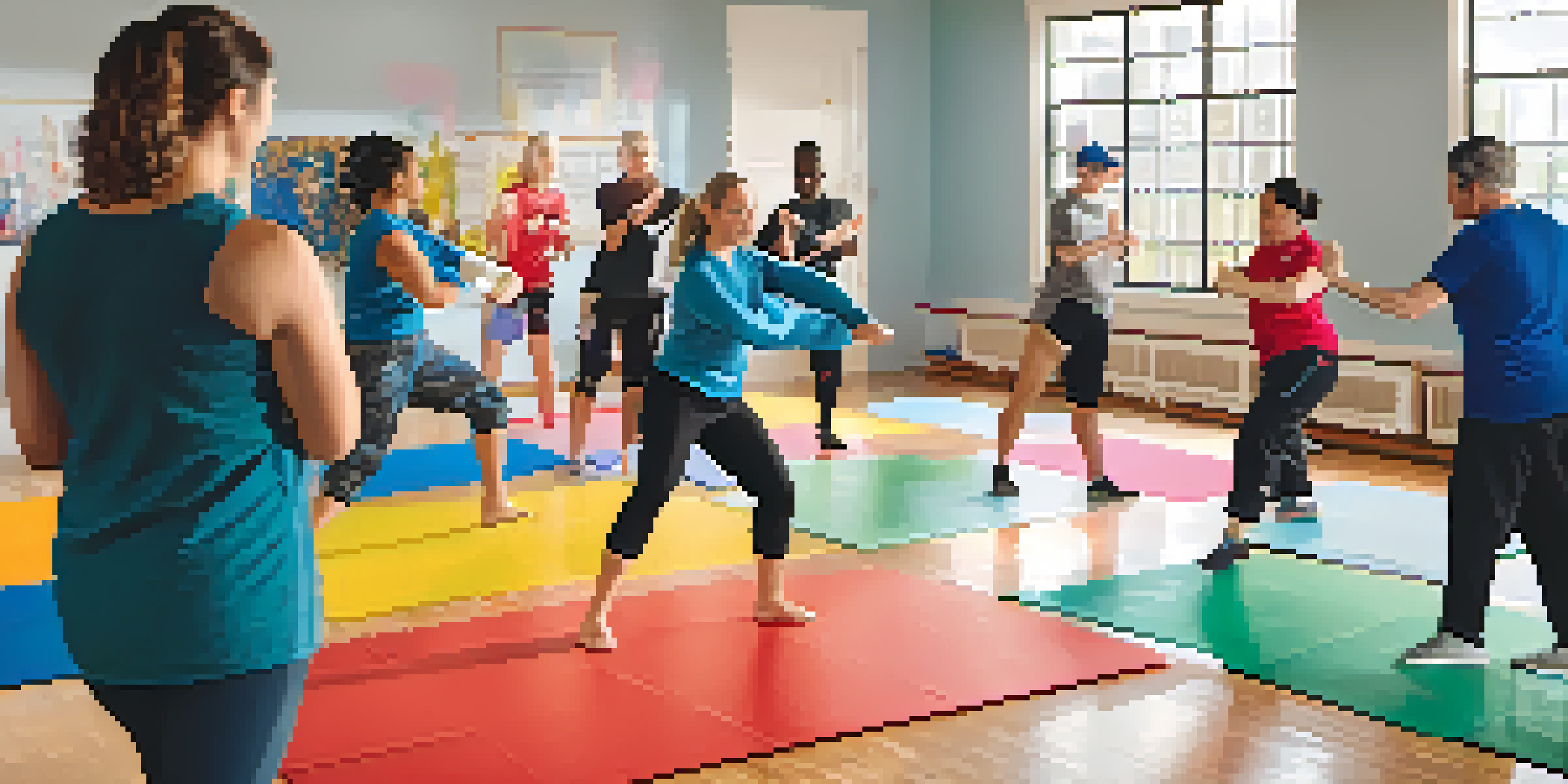Creating a Safe Space: Self Defense for Autistic Individuals

Understanding the Importance of Self-Defense
Self-defense is a crucial skill for everyone, including autistic individuals. It empowers them to feel safe and secure in various situations, whether in public or at home. Learning how to protect oneself can also boost confidence and foster independence.
The best way to predict the future is to create it.
For autistic individuals, navigating social interactions can sometimes be challenging. Understanding self-defense not only provides physical safety but also teaches essential skills like awareness and assertiveness. This knowledge can help them respond appropriately to potential threats.
Moreover, self-defense is about more than just physical techniques; it's about building a mindset that values personal safety. By embracing this mindset, autistic individuals can cultivate a sense of control in their lives, which is incredibly empowering.
Building Awareness and Recognizing Threats
Awareness is key in self-defense, especially for autistic individuals who may have sensory sensitivities. Learning to recognize potential threats in their environment is the first step in any self-defense strategy. This can include being mindful of their surroundings and understanding social cues.

For example, if someone feels uncomfortable in a crowded space, it's important for them to trust their instincts and find a safer area. Practicing situational awareness can make a significant difference in avoiding potentially dangerous encounters.
Self-Defense Boosts Confidence
Learning self-defense empowers autistic individuals by enhancing their safety, confidence, and independence.
Incorporating role-playing exercises can help autistic individuals practice recognizing threats in a safe environment. By simulating various scenarios, they can learn to respond effectively, which can help reduce anxiety and enhance their confidence.
Physical Techniques for Self-Defense
While self-defense is often associated with physical techniques, it's important to focus on methods that are accessible and comfortable for autistic individuals. Simple moves like blocking, escaping holds, or creating distance can be effective without requiring extensive training.
Self-defense is not just about protecting oneself; it's about building confidence and gaining control over one's own life.
Martial arts classes or self-defense workshops specifically tailored for autistic individuals can provide a supportive learning environment. These classes can also emphasize techniques that align with their physical abilities and comfort levels, ensuring they feel safe while learning.
Remember, the goal of self-defense is not to engage in combat but to escape and seek safety. Teaching autistic individuals how to use their body effectively can empower them to feel more secure and capable in challenging situations.
The Role of Communication in Self-Defense
Effective communication is vital in self-defense, both in terms of expressing one's needs and understanding others. Autistic individuals can benefit from learning how to assertively communicate their boundaries and feelings. This can help prevent situations from escalating.
Practicing phrases like 'I need space' or 'Please stop' can empower them to voice their discomfort in various situations. Role-playing these scenarios with trusted friends or family can reinforce these skills, making them feel more natural and less intimidating.
Awareness is Key to Safety
Developing awareness of surroundings helps autistic individuals recognize potential threats and respond appropriately.
Additionally, having clear communication tools, such as visual aids or written scripts, can provide extra support. These tools can help autistic individuals feel prepared and confident when faced with challenging interactions.
Creating a Supportive Environment
A supportive environment is essential for learning self-defense. Families, friends, and educators can foster a safe space where autistic individuals feel encouraged to express their feelings and practice self-defense skills. This environment can significantly enhance their learning experience.
Consider engaging with local community organizations that focus on self-defense training for autistic individuals. These organizations often provide resources, workshops, and a network of support that can be incredibly beneficial.
Additionally, involving caregivers in the process can ensure consistency in practicing self-defense techniques. Caregivers can encourage and reinforce the skills learned, making it easier for autistic individuals to implement them in real-life situations.
Mindfulness and Emotional Regulation
Mindfulness practices can complement self-defense training by helping autistic individuals manage anxiety and stay calm in stressful situations. Techniques like deep breathing, visualization, or grounding exercises can enhance emotional regulation, making it easier to respond effectively when faced with a potential threat.
Incorporating mindfulness into self-defense training also allows individuals to connect with their bodies and understand their physical responses to stress. This self-awareness can be incredibly empowering and aid in recognizing when they might need to use their self-defense skills.
Supportive Environments Foster Growth
Creating a supportive environment for practicing self-defense is essential for autistic individuals to feel safe and encouraged in their learning.
By practicing mindfulness regularly, autistic individuals can cultivate a sense of inner peace and resilience. This not only helps in self-defense scenarios but also contributes to overall well-being and confidence in daily life.
Resources for Learning Self-Defense
Numerous resources are available for autistic individuals interested in learning self-defense. Local martial arts studios may offer specialized classes, while online platforms provide a range of instructional videos tailored to various skill levels. Exploring these options can help individuals find the right fit for their needs.
Books and online articles focused on self-defense can provide additional insights and techniques. Many of these resources emphasize adaptations for different abilities, making them accessible for everyone. Encouraging individuals to explore these resources can empower them to take charge of their learning.

Finally, connecting with local autism support groups can lead to recommendations for self-defense programs. These groups often share valuable information and create a sense of community, further enhancing the learning experience.
Empowering Autistic Individuals through Self-Defense
Ultimately, self-defense is about empowerment. By teaching autistic individuals the skills and strategies needed to protect themselves, we help them build confidence and independence. This empowerment can lead to a more fulfilling and secure life.
Self-defense training also fosters a sense of community and belonging. As individuals learn together, they can create supportive networks that promote safety and understanding among peers. This sense of unity can be incredibly comforting.
Encouraging autistic individuals to embrace self-defense as a lifelong skill can offer numerous benefits, from increased safety to improved self-esteem. Together, we can create a world where everyone feels empowered to advocate for their own safety and well-being.